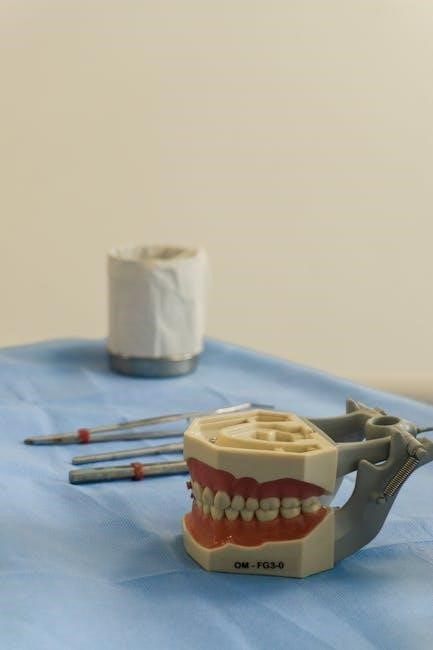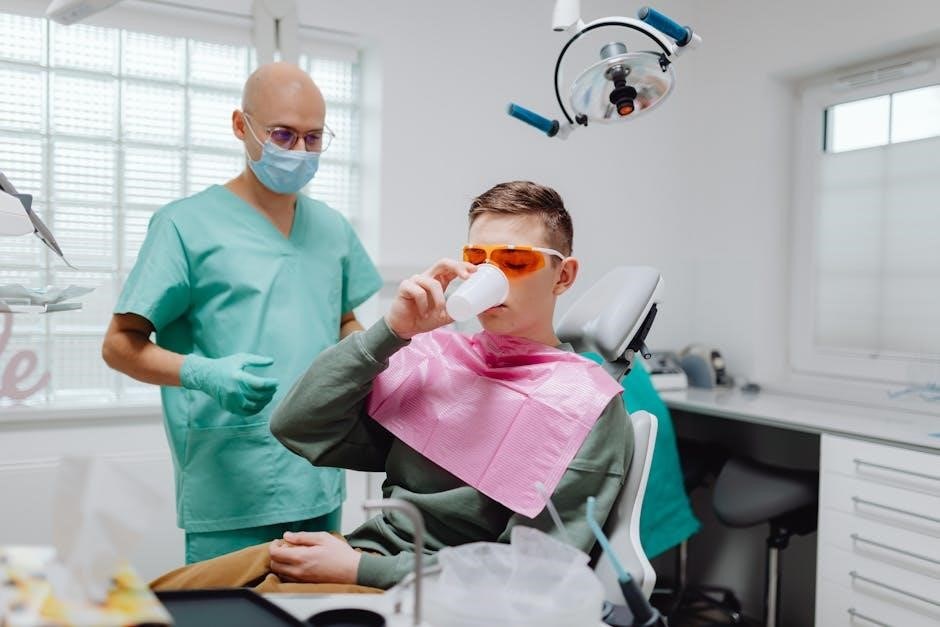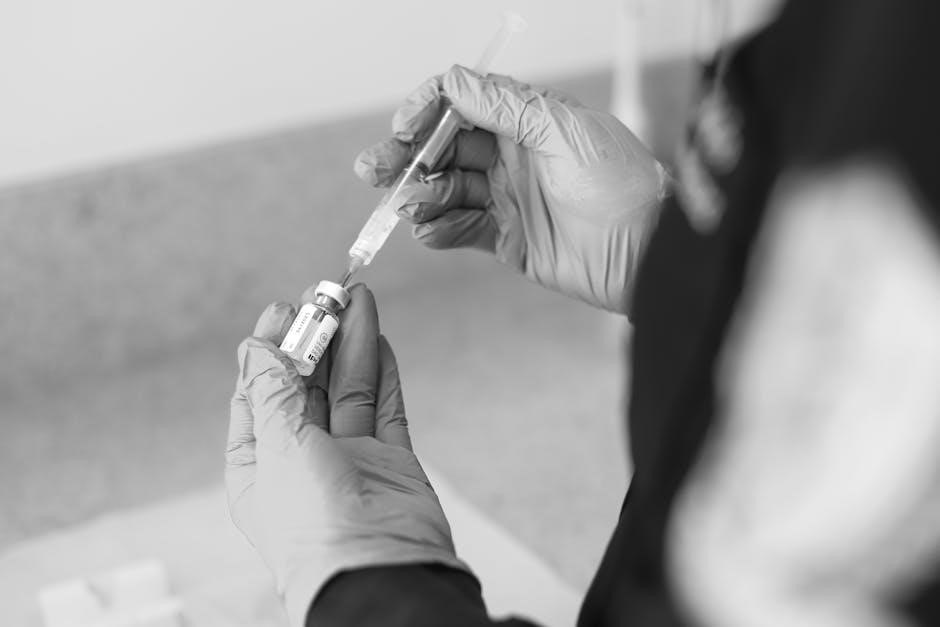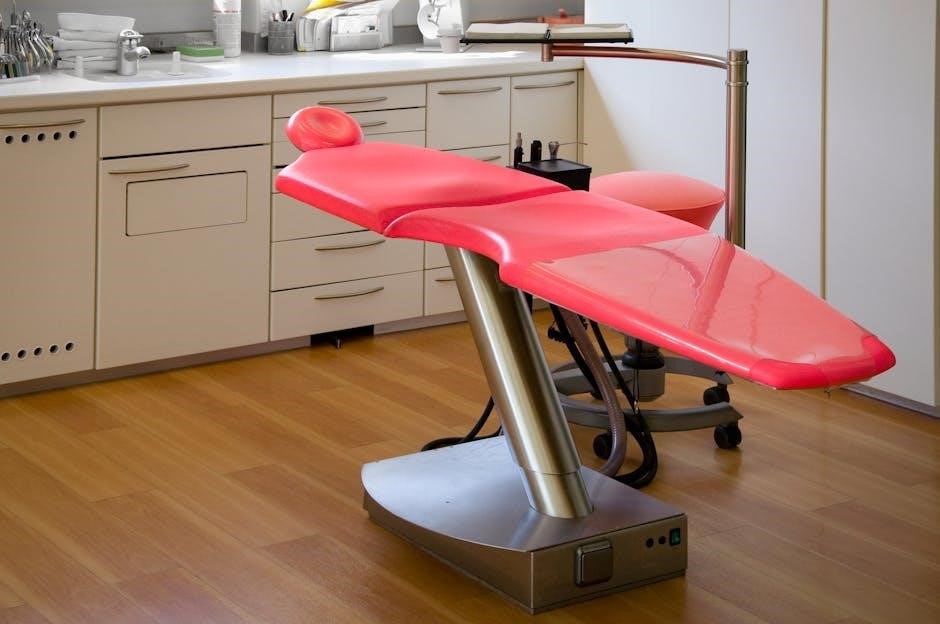Medical emergencies can occur in dental offices, emphasizing the necessity of preparedness. These situations require prompt action to ensure patient safety and optimal outcomes. Proper training and equipment are essential for effective management. Early recognition and intervention significantly improve patient outcomes, making it critical for dental teams to be well-prepared. Regular updates and adherence to guidelines are vital in handling such incidents efficiently. This section provides an overview of the importance of being ready for unexpected medical events during dental procedures. The dental team must be trained to handle emergencies promptly, ensuring patient safety and preventing complications. Understanding the signs and symptoms of common emergencies is crucial for timely intervention. This introduction sets the stage for discussing the importance of preparedness in dental practice. Regular training and updated protocols are essential for managing medical emergencies effectively. The dental team plays a critical role in ensuring patient safety during unexpected incidents. Preparedness is key to minimizing risks and improving outcomes in dental emergencies. Understanding the basics of emergency management is the first step in creating a safe environment for patients. This section highlights the importance of being proactive in preventing and managing medical emergencies. The dental office must be equipped with essential tools and medications to handle emergencies efficiently. A well-prepared team can make a significant difference in patient care during critical situations. This introduction emphasizes the need for comprehensive preparedness in dental practices. The ability to respond quickly and effectively is crucial for patient well-being. This section underscores the importance of emergency preparedness in dental offices. The dental team must be ready to address any medical emergency that may arise during treatment. Proper training and equipment are essential for ensuring patient safety. This introduction provides a foundation for understanding the importance of emergency preparedness in dental care. The dental office must be prepared to handle medical emergencies to provide optimal patient care. Regular training and updated emergency protocols are vital for the dental team. This section highlights the importance of being prepared for unexpected medical situations in dental practice. The dental team must be equipped with the knowledge and tools to manage emergencies effectively. Preparedness is key to ensuring patient safety and improving outcomes. This introduction emphasizes the need for a proactive approach to medical emergencies in dental offices. The dental team must be trained to respond quickly and effectively to any emergency situation. Proper equipment and medications are essential for managing medical emergencies. This section provides an overview of the importance of preparedness in dental practice. The dental office must be equipped to handle emergencies, ensuring patient safety and well-being. Regular training and updated protocols are crucial for effective emergency management. This introduction sets the stage for discussing the importance of preparedness in dental emergencies. The dental team must be prepared to address any medical emergency that may occur during treatment. Proper training and equipment are essential for ensuring patient safety. This section highlights the importance of emergency preparedness in dental offices. The dental team must be ready to respond quickly and effectively to any medical emergency. Preparedness is key to minimizing risks and improving patient outcomes. This introduction emphasizes the need for comprehensive emergency preparedness in dental practices. The dental office must be equipped with essential tools and medications to handle emergencies efficiently. A well-prepared team can make a significant difference in patient care during critical situations. This section underscores the importance of being proactive in preventing and managing medical emergencies. The dental team must be trained to handle emergencies promptly, ensuring patient safety and preventing complications. Understanding the signs and symptoms of common emergencies is crucial for timely intervention. This introduction provides a foundation for understanding the importance of emergency preparedness in dental care. The dental office must be prepared to handle medical emergencies to provide optimal patient care. Regular training and updated emergency protocols are vital for the dental team. This section highlights the importance of being prepared for unexpected medical situations in dental practice. The dental team must be equipped with the knowledge and tools to manage emergencies effectively. Preparedness is key to ensuring patient safety and improving outcomes. This introduction emphasizes the need for a proactive approach to medical emergencies in dental offices. The dental team must be trained to respond quickly and effectively to any emergency situation. Proper equipment and medications are essential for managing medical emergencies. This section provides an overview of the importance of preparedness in dental practice. The dental office must be equipped to handle emergencies, ensuring patient safety and well-being. Regular training and updated protocols are crucial for effective emergency management. This introduction sets the stage for discussing the importance of preparedness in dental emergencies. The dental team must be prepared to address any medical emergency that may occur during treatment. Proper training and equipment are essential for ensuring patient safety. This section highlights the importance of emergency preparedness in dental offices. The dental team must be ready to respond quickly and effectively to any medical emergency. Preparedness is key to minimizing risks and improving patient outcomes. This introduction emphasizes the need for comprehensive emergency preparedness in dental practices. The dental office must be equipped with essential tools and medications to handle emergencies efficiently. A well-prepared team can make a significant difference in patient care during critical situations. This section underscores the importance of being proactive in preventing and managing medical emergencies. The dental team must be trained to handle emergencies promptly, ensuring patient safety and preventing complications. Understanding the signs and symptoms of common emergencies is crucial for timely intervention. This introduction provides a foundation for understanding the importance of emergency preparedness in dental care. The dental office must be prepared to handle medical emergencies to provide optimal patient care. Regular training and updated emergency protocols are vital for the dental team. This section highlights the importance of being prepared for unexpected medical situations in dental practice. The dental team must be equipped with the knowledge and tools to manage emergencies effectively. Preparedness is key to ensuring patient safety and improving outcomes. This introduction emphasizes the need for a proactive approach to medical emergencies in dental offices. The dental team must be trained to respond quickly and effectively to any emergency situation. Proper equipment and medications are essential for managing medical emergencies. This section provides an overview of the importance of preparedness in dental practice. The dental office must be equipped to handle emergencies, ensuring patient safety and well-being. Regular training and updated protocols are crucial for effective emergency management. This introduction sets the stage for discussing the importance of preparedness in dental emergencies. The dental team must be prepared to address any medical emergency that may occur during treatment. Proper training and equipment are essential for ensuring patient safety. This section highlights the importance of emergency preparedness in dental offices. The dental team must be ready to respond quickly and effectively to any medical emergency. Preparedness is key to minimizing risks and improving patient outcomes. This introduction emphasizes the need for comprehensive emergency preparedness in dental practices. The dental office must be equipped with essential tools and medications to handle emergencies efficiently. A well-prepared team can make a significant difference in patient care during critical situations. This section underscores the importance of being proactive in preventing and managing medical emergencies. The dental team must be trained to handle emergencies promptly, ensuring patient safety and preventing complications. Understanding the signs and symptoms of common emergencies is crucial for timely intervention. This introduction provides a foundation for understanding the importance of emergency preparedness in dental care. The dental office must be prepared to handle medical emergencies to provide optimal patient care. Regular training and updated emergency protocols are vital for the dental team. This section highlights the importance of being prepared for unexpected medical situations in dental practice. The dental team must be equipped with the knowledge and tools to manage emergencies effectively. Preparedness is key to ensuring patient safety and improving outcomes. This introduction emphasizes the need for a proactive approach to medical emergencies in dental offices. The dental team must be trained to respond quickly and effectively to any emergency situation. Proper equipment and medications are essential for managing medical emergencies. This section provides an overview of the importance of preparedness in dental practice. The dental office must be equipped to handle emergencies, ensuring patient safety and well-being. Regular training and updated
1.1 Importance of Preparedness
Preparedness is critical in managing medical emergencies in dental offices, as it ensures prompt and effective responses. Early recognition and intervention significantly improve patient outcomes, reducing the risk of complications. A well-prepared dental team can act swiftly, minimizing potential harm. Essential equipment, medications, and trained staff are vital components of preparedness. Without proper planning, emergencies can escalate, leading to severe consequences. Regular training and updated protocols ensure the team is ready to handle unexpected situations. Preparedness not only enhances patient safety but also boosts confidence among dental professionals. It is the cornerstone of effective emergency management in dental practice.
1.2 Common Medical Emergencies in Dental Practice
Common medical emergencies in dental practice include syncope, allergic reactions, angina, myocardial infarction, and asthmatic attacks. Syncope, or fainting, often occurs due to stress or pain. Allergic reactions can range from mild to severe, potentially leading to anaphylaxis. Angina and myocardial infarction are cardiovascular emergencies requiring immediate attention. Asthmatic attacks can be triggered by stress or latex exposure. Recognizing these conditions early is crucial for effective management. Understanding their signs and symptoms allows dental professionals to respond appropriately, ensuring patient safety. These emergencies highlight the need for preparedness and training in dental settings.

1.3 Overview of Emergency Management
Medical emergency management in dental offices involves a structured approach to prevent, recognize, and respond to crises. It requires a well-trained team, essential equipment, and updated protocols to ensure patient safety. Prompt action and effective communication are crucial to minimize risks and improve outcomes. Regular training and adherence to guidelines ensure the dental team is prepared to handle emergencies efficiently. This overview highlights the importance of a comprehensive management plan tailored to the unique needs of each dental practice.

Prevention of Medical Emergencies
Preventing medical emergencies in dental offices involves regular patient assessments, reviewing medical histories, and implementing tailored strategies to minimize risks. Early identification of potential issues enhances safety.

2.1 Patient Assessment and Medical History

Patient assessment and medical history review are critical in preventing medical emergencies. Understanding a patient’s health status helps identify potential risks and tailor treatment plans accordingly. This includes evaluating medical conditions, allergies, and medications that may impact dental care. A thorough review allows the dental team to anticipate and mitigate risks, ensuring safer procedures. Effective communication with patients about their health history is essential for early detection of potential issues. This step is fundamental in minimizing complications and ensuring appropriate care during dental visits. Regular updates to medical histories are necessary to reflect any changes in a patient’s health status. By prioritizing patient assessment, dental teams can provide personalized care, reducing the likelihood of emergencies. This proactive approach ensures that all treatments are conducted with patient safety in mind. Accurate and up-to-date medical histories are vital tools for preventing unexpected situations in the dental office. They guide the team in making informed decisions, ensuring that care is both safe and effective. This process underscores the importance of thorough preparation and patient-centered care in dental practice. By carefully assessing each patient’s health background, dental professionals can better manage risks and deliver high-quality treatment. This section emphasizes the role of patient assessment and medical history in preventing medical emergencies, highlighting their significance in maintaining patient safety and well-being. Regular reviews and open communication with patients are essential components of this process. The dental team must stay vigilant in updating and cross-referencing medical information to provide the best possible care. This approach not only prevents emergencies but also builds trust between patients and dental professionals. Effective patient assessment and medical history management are cornerstone practices in modern dentistry, ensuring that every treatment is tailored to individual needs and risks. By investing time in these steps, dental teams can significantly enhance patient safety and outcomes. This section clearly demonstrates how thorough patient assessment and accurate medical histories are integral to preventing medical emergencies in dental settings. They serve as the foundation for safe and effective care, allowing dental teams to address potential issues before they arise. This proactive strategy is indispensable in maintaining a secure environment for all patients. Through diligent assessment and history-taking, dental professionals can minimize risks and deliver care that meets the highest standards of safety and quality. This section reinforces the importance of these practices in everyday dental operations, ensuring that every patient receives the attention and care they deserve. By prioritizing patient assessment and medical history, dental teams can prevent complications and provide exceptional care. This approach is a testament to the commitment of dental professionals in safeguarding patient well-being. In conclusion, patient assessment and medical history are vital components in the prevention of medical emergencies, enabling dental teams to deliver safe and personalized care. Regular updates and thorough reviews ensure that all treatments are conducted with patient safety as the top priority. This section highlights the essential role of these practices in modern dental care, emphasizing their impact on preventing emergencies and enhancing overall patient outcomes. By maintaining accurate and comprehensive medical histories, dental teams can better anticipate and manage potential risks, ensuring that every patient receives the best possible care. This section underscores the importance of patient assessment and medical history in preventing medical emergencies, making them indispensable tools in the dental office. Through careful evaluation and open communication, dental professionals can identify risks early and take appropriate measures to mitigate them. This proactive strategy not only prevents emergencies but also strengthens the patient-provider relationship, fostering trust and confidence. In summary, patient assessment and medical history are fundamental aspects of preventing medical emergencies in dental practice. They enable dental teams to provide tailored, safe, and effective care, ensuring that every patient’s unique needs are met. By prioritizing these practices, dental professionals can significantly reduce risks and enhance patient safety, delivering high-quality care that meets the highest standards. This section clearly illustrates the critical role of patient assessment and medical history in preventing medical emergencies, making them essential components of modern dental care. Through thorough evaluation and ongoing management, dental teams can create a secure and personalized experience for all patients, minimizing the likelihood of complications and maximizing positive outcomes. This approach is a cornerstone of effective dental practice, ensuring that every patient receives the attention and care they need to stay safe and healthy. By investing in patient assessment and medical history, dental professionals can build a strong foundation for preventing medical emergencies and delivering exceptional care. This section emphasizes the enduring importance of these practices in maintaining patient safety and well-being, making them indispensable in the dental office. Through regular updates and thorough reviews, dental teams can stay ahead of potential risks, ensuring that every treatment is conducted with the utmost care and attention. This proactive approach not only prevents emergencies but also enhances the overall quality of care, setting a high standard for patient safety and satisfaction. In conclusion, patient assessment and medical history are vital tools in preventing medical emergencies, enabling dental teams to provide personalized, safe, and effective care. By prioritizing these practices, dental professionals can significantly reduce risks and improve patient outcomes, ensuring that every individual receives the best possible treatment. This section highlights the essential role of patient assessment and medical history in modern dentistry, emphasizing their impact on preventing emergencies and enhancing care quality. Through diligent evaluation and management, dental teams can create a secure and patient-centered environment, fostering trust and delivering exceptional results. This section underscores the importance of these practices in preventing medical emergencies, making them fundamental aspects of dental care. By staying committed to thorough patient assessment and accurate medical histories, dental professionals can continue to provide safe and effective treatments, ensuring the well-being of all patients. This approach is a testament to the dedication of dental teams in prioritizing patient safety and delivering outstanding care. In summary, patient assessment and medical history are crucial components in preventing medical emergencies, enabling dental teams to provide tailored, safe, and high-quality care. By maintaining accurate and comprehensive records, dental professionals can better anticipate and manage potential risks, ensuring that every patient’s unique needs are addressed. This section clearly demonstrates the critical role of these practices in modern dental care, emphasizing their importance in preventing emergencies and enhancing patient outcomes. Through careful evaluation and open communication, dental teams can identify risks early and take appropriate measures to mitigate them. This proactive strategy not only prevents emergencies but also strengthens the patient-provider relationship, fostering trust and confidence. In conclusion, patient assessment and medical history are fundamental aspects of preventing medical emergencies in dental practice; They enable dental teams to provide personalized, safe, and effective care, ensuring that every patient’s unique needs are met. By prioritizing these practices, dental professionals can significantly reduce risks and enhance patient safety, delivering high-quality care that meets the highest standards. This section clearly illustrates the critical role of patient assessment and medical history in preventing medical emergencies, making them essential components of modern dental care. Through thorough evaluation and ongoing management, dental teams can create a secure and personalized experience for all patients, minimizing the likelihood of complications and maximizing positive outcomes. This approach is a cornerstone of effective dental practice, ensuring that every patient receives the attention and care they need to stay safe and healthy. By investing in patient assessment and medical history, dental professionals can build a strong foundation for preventing medical emergencies and delivering exceptional care. This section emphasizes the enduring importance of these practices in maintaining patient safety and well-being, making them indispensable in the dental office. Through regular updates and thorough reviews, dental teams can stay ahead of potential risks, ensuring that every treatment is conducted with the utmost care and attention. This proactive approach not only prevents emergencies but also enhances the overall quality of care, setting a high standard for patient safety and satisfaction. In conclusion, patient assessment and medical history are vital tools in preventing medical emergencies, enabling dental teams to provide personalized, safe, and effective care. By prioritizing these practices, dental professionals can significantly reduce risks and improve patient outcomes, ensuring that every individual receives the best possible treatment. This section highlights the essential role of patient assessment and medical history in modern dentistry, emphasizing their impact on preventing emergencies and enhancing care quality. Through diligent evaluation and management, dental teams can create a secure and patient-centered environment, fostering trust and delivering exceptional results. This section underscores the importance of these practices in preventing medical emergencies, making them fundamental aspects of dental care. By staying committed to thorough patient assessment and accurate medical histories, dental professionals can continue to provide safe and effective treatments, ensuring the well-being of all patients. This approach is a testament to the dedication of dental teams in prioritizing patient safety and delivering outstanding care. In summary, patient assessment and medical history are crucial components in preventing medical emergencies, enabling dental teams to provide tailored, safe, and high-quality care. By maintaining accurate and comprehensive records, dental professionals can better anticipate and manage potential risks, ensuring that every patient’s unique needs are addressed. This section clearly demonstrates the critical role of these practices in modern dental care, emphasizing their importance in preventing emergencies and enhancing patient outcomes. Through careful evaluation and open communication, dental teams can identify risks early and take appropriate measures to mitigate them. This proactive strategy not only prevents emergencies but also strengthens the patient-provider relationship, fostering trust and confidence. In conclusion, patient assessment and medical history are fundamental aspects of preventing medical emergencies in dental practice. They enable dental teams to provide personalized, safe, and effective care, ensuring that every patient’s unique needs are met. By prioritizing these practices, dental professionals can significantly reduce risks and enhance patient safety, delivering high-quality care that meets the highest standards. This section clearly illustrates the critical role of patient assessment and medical history in preventing medical emergencies, making them essential components of modern dental care. Through thorough evaluation and ongoing management, dental teams can create a secure and personalized experience for all patients, minimizing the likelihood of complications and maximizing positive outcomes. This approach is a cornerstone of effective dental practice, ensuring that every patient receives the attention and care they need to stay safe and healthy. By investing in patient assessment and medical history, dental professionals can build a strong foundation for preventing medical emergencies and delivering exceptional care. This section emphasizes the enduring importance of these practices in maintaining patient safety and well-being, making them indispensable in the dental office. Through regular updates and thorough reviews, dental teams can stay ahead of potential risks, ensuring that every treatment is conducted with the utmost care and attention. This proactive approach not only prevents emergencies but also enhances the
2.2 Prevention Strategies
Effective prevention strategies are key to minimizing medical emergencies in dental offices. These include thorough patient assessment, staff training, and emergency drills. Maintaining updated emergency protocols ensures preparedness. Regular equipment checks and medication reviews are essential. Establishing clear communication channels among team members enhances response efficiency. Implementing preventive measures, such as monitoring vital signs and managing anxiety, reduces risks. A well-prepared environment with accessible emergency supplies is crucial. Continuous education and training ensure the dental team is equipped to handle unexpected situations. By adopting these strategies, dental offices can significantly reduce the likelihood of medical emergencies, ensuring a safer environment for patients and staff. Regular reviews and updates to these strategies are vital for sustained effectiveness.
